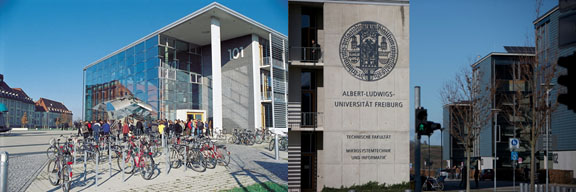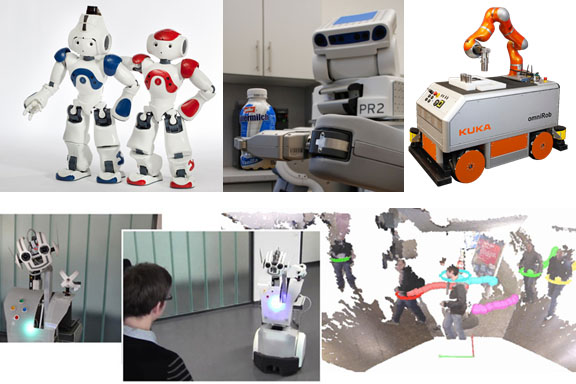The Faculty of Engineering consists of two departments: the Department of Computer Science and the Department of Microsystems Engineering. The technical tour will include both departments and involves the following seven research labs located in Freiburg:
- AIS – the Autonomous Intelligent Systems lab, which is concerned with techniques for autonomous navigation, state estimation and motion control in the context of mobile robotics. Link: https://ais.informatik.uni-freiburg.de
- BMT – the laboratory of Biomedical Microtechnology works on the design and development on neural microimplants. Link: https://www.imtek.de/professuren/bmt/
- GKI – the Foundations of Artificial Intelligence lab is a versatile group in artificial intelligence research. Link: https://gki.informatik.uni-freiburg.de
- HRL – the Humanoid Robots Lab with its main research focus on humanoid robots acting in multi-level indoor environments that contain articulated and movable objects. Link: https://hrl.informatik.uni-freiburg.de
- MEMS – the Lab of MEMS applications with strong expertise on microfluidics and BioMEMS. Link: https://www.imtek.de/laboratories/mems-applications/research/overview
- ML – the Machine Learning lab, which focuses on the application of neural learning methods, in particular reinforcement learning (RL) algorithms to real world applications. Link: https://ml.informatik.uni-freiburg.de
- SRL – the Social Robotics Lab is concerned with the questions how humans and robots can better live, work, and interact together. Link: https://srl.informatik.uni-freiburg.de
Schedule (10th May, 2013)
Time | Activity |
|---|---|
| 8:00 | Departure from Karlsruhe (Kongresszentrum) |
| 9:45 | Arrival in Freiburg |
| 10:00 | Welcome & Overview of the Faculty (Cyrill Stachniss) |
| 10:20 - 12:30 | Demos (4 parallel groups of ~12 people) |
| 12:30 - 13:30 | Lunch |
| 14:00 | Going to downtown |
| 14:30 - 16:00 | Guided tour through Freiburg downtown (3-4 groups) |
| 16:00 - 17:00/17:30 | Individual shopping (no guides) |
| 17:30 | Bus leaves to KA (from downtown) |
AIS
The Autonomous Intelligent Systems lab of the University of Freiburg is concerned with techniques for autonomous navigation, state estimation and motion control in the context of mobile robotics and artificial intelligence. One of the major research areas covered by this lab is mobile robot navigation and in the past, members of the AIS lab have contributed several innovative algorithms for this area. This includes techniques for autonomous exploration, learning two- and three-dimensional maps, vision-based localization, outdoor-navigation with rovers and mapping with helicopters and the deployment of interactive robots in trade shows and museums. The AIS lab will demonstrate the KUKA omniRob platform, results from the PR2 project and a flying vehicle.
Link: https://ais.informatik.uni-freiburg.de
BMT
The laboratory of Biomedical Microtechnology works on the design and development on neural microimplants, e.g. interfaces for recording and stimulation at the peripheral nerve and the cortex, novel biocompatible assembling and packaging techniques, and evaluation of the biostability of substrate and insulation materials. The group has access to the microsystems engineering cleanroom of the IMTEK and owns laboratories for electrode and implant characterization including an ISO 13485-certified human implant fabrication cleanroom. Biomedical microdevices are developed as tools for neuroscientific research as well as for clinical trials.
Link: https://www.imtek.de/professuren/bmt/startseite_bmt
GKI
The Foundations of Artificial Intelligence lab is a versatile group in artificial intelligence research. Most of our works may be subsumed under one of the following three main research lines: AI planning and model checking, knowledge representation, and robotics. The group conducted several robotics projects ranging from cognitive modeling over AI planning to RoboCup and RoboCup Rescue. As one of our showcases, we will demonstrate KiRo, a completely autonomous table soccer playing robot: with the help of a camera it perceives the playing field and decides how the rods under its control should be moved depending on the current game situation.
Link: https://gki.informatik.uni-freiburg.de
HRL
The Humanoid Robots Lab was founded in 2008 and is headed by Maren Bennewitz.The main research focus lies on humanoid robots acting in multi-level indoor environments that contain articulated and movable objects. The Humanoid Robots Lab develops robust methods for 3D environment modeling as well as for manipulation and navigation with humanoids. The developed software, e.g., for 3D environment modeling, localization, and footstep planning has been integrated into the Robot Operating System (ROS) and is used world wide.
Link: https://hrl.informatik.uni-freiburg.de
MEMS
The Lab of MEMS Applications, headed by Roland Zengerle, has a strong expertise on microfluidics and BioMEMS. In close cooperation with the Institut für Mikro- und Informationstechnik of the Hahn-Schickard-Gesellschaft (HSG-IMIT), research is focused on solutions that meet the needs of society as well as the market. The main areas of operation are contact-free microdosage technologies for nanoliter and picoliter liquid handling, Lab-on-a-Chip systems, microfluidic and biological engineering, biofuel cells, and porous media. The group will present technological examples for automated liquid handling relevant for diagnostics and Life Science.
Link: https://www.imtek.de/laboratories/mems-applications/research/overview
ML
The Machine Learning lab at the University of Freiburg, headed by Martin Riedmiller, has a strong focus on the application of neural learning methods, in particular reinforcement learning (RL) algorithms to real world applications. Our current research focuses on data-efficient reinforcement learning algorithms, the combination of deep learning methods and RL and the application to closed-loop control, e.g. in robotics and video games. We will demonstrate the application of a neural reinforcement learning controller to a ‘reach and grasp’ problem. In this visual servoing setting, the robot arm learns to reactively grasp an object from scratch, merely by the experience of success or failure.
Link: https://ml.informatik.uni-freiburg.de
SRL
The Social Robotics Lab is concerned with the questions how humans and robots can better live, work, and interact together. Our research covers areas such as perception of humans, human behavior modeling, socially normative planning, and design of sustainable human-robot interfaces. We will demonstrate the robot DARYL, a new custom-designed interactive mobile platform with 10 degrees of freedom, its abilities to perceive people and interact with them.





















